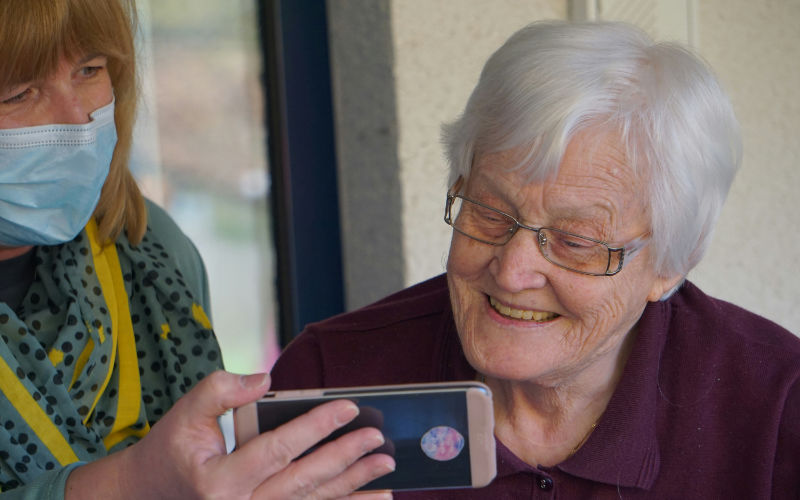Digital disruption has come to the disability and aged care sectors, with mixed reviews. The digital economy and its effect on itinerant ‘gig workers’ now reaches well beyond rideshare and home delivery services. Zacharias Szumer investigates.
Perhaps evincing a masochistic taste in literature, this correspondent recently decided to sink his teeth into the gig worker reforms subsection of the Senate inquiry report into Labor’s Closing Loopholes bill.
While certainly not a page-turner, the section was somewhat enlivened by a detectable level of vitriol directed towards a company called Mable.
Mable, which acts as an intermediary between care workers and their clients, incurred the committee’s wrath for insisting that it wasn’t a gig economy platform at all and thus shouldn’t be regulated alongside Uber, DoorDash and co.
While the aforementioned rideshare and food delivery platforms engaged with the process in a “constructive” manner, the report’s authors wrote, Mable had deployed “spurious arguments” to request it be wholly carved out of the reforms.
While it seems that Mable’s efforts weren’t totally successful, and the Fair Work Commission may still be able to impose minimum standards upon its workforce, some experts say cross-bench amendments to the bill have made it significantly harder (more on that later).
Clear as mud: gig workers’ rights versus Uber, Deliveroo, Ola and Menulog fight for flexibility
Horizontal marketplace or digital platform?
Mable was launched in 2014 with a mission to “unlock productivity gains” in Australia’s aged care and disability sectors. It says it now has over 17,000 independent contractors and 22,000 clients on its platform.
On Mable, approved aged care and disability clients and workers connect via self-made profiles. In addition to hosting this digital marketplace, Mable also provides insurance and helps process invoices, among other services.
Unlike a service such as Uber, where the company offers a job at a certain price and a worker can either take it or leave it, Mable contractors and clients quote their own price. Although, as in any market, there’s no guarantee they’ll get it.
Mable contractors are also paid per hour rather than per job.
Because of these differences, Mable insisted to the Senate that it isn’t part “of the ‘gig economy’ or in any way similar to platforms in rideshare and food delivery”.
Leaving aside the precise delineations of the ‘gig economy’, in one sense, Mable is applying a well-established gig platform business model; for the last decade, it has steadily run at a loss, aiming for expansion and market share over profitability.
Uber, by comparison, was launched in 2009 and only became profitable in 2023.
To stay afloat prior to profitability, such companies rely on large injections of investor finance. For instance, Mable received $100 million from one of the world’s largest private equity firms in 2021.
Flexible contractors or overstretched digital serfs?
Mable’s Closing Loopholes inquiry submission cited a company-commissioned YouGov survey that found “91 per cent of digital platform service providers rated their experience as ‘very good’ or ‘good’”.
“Support providers on Mable rate their overall experience, satisfaction with hourly rate and whether they feel trusted, significantly higher than support workers employed by traditional providers,” the submission said.
A Mable spokesperson told MWM that the company was clearly providing a desirable work opportunity as its growth was occurring at a time when “there are thousands of direct employment opportunities available in the care and support sector”.
Several Mable contractors who appeared alongside the Health Services Union (HSU) at an October Closing Loopholes inquiry hearing painted a less rosy picture.
One said that “Mable doesn’t check on the wellbeing of workers or provide them with feedback” and that the “occupational health and safety standards for workers were not up to the standard.” One commented that:
There’s so much pressure to do unpaid work … You’re always under pressure, and you don’t have full control over your work.
The HSU told the Senate that digital platform care workers earned “on average anywhere from 5 per cent to 55 per cent less than already low-paid comparable workers when platform fees and superannuation are taken into account.”
The Senate report found that Mable “does enable workers to earn below the minimum award wage,” but Mable says its workers “earn more on average” than their counterparts in traditional employer-employee relationships and other digital platforms.
Internet vox pops and Mable PR
Seeking to cast a net beyond official statements and union-facilitated witnesses, MWM sought feedback about Mable on several disability and aged care-related issues on internet forums, posting in several private Facebook groups and making this Reddit post.
Responses were mixed.
Mable “encourages workers to bid to the bottom to get work, which after fees often result in getting paid less than formal employment,” said one worker, while another said they were “very happy with Mable.”.
One support worker, who has now moved on to direct employment, described Mable as “a great stepping stone,” while another said the platform takes “a pretty unreasonable cut, but you can bump your rate up to cover it”.
FYI: Mable takes a 10 per cent commission from the worker and a 7.95 per cent service fee from clients. E.g. If a contractor requests $50 per hour, they’ll get $45, while Mable will get $5 plus around $4 from the client.
Some workers complained that payment was slow, while others said they’d had “minimal problems with payments.”
While most comments and private messages received were critical of Mable, the disgruntled are perhaps more likely to leave reviews than those who were content.
Shortly after posting on Reddit, MWM was contacted by Mable’s PR rep to arrange for him to hear several worker and client testimonials – all of which were, unsurprisingly, quite positive.
Jacob Darkin, who is both a support worker and NDIS client, told MWM that his experience using the platform was overwhelmingly positive, saying that Mable offered a safe way to connect with highly skilled workers.
“I think if they just keep listening to what people want – whether it’s support workers or people with disabilities – and try to make improvements so we benefit, then I think they’ll be a provider for a long time,” he said.
While Darkin is a paid member of Mable’s Independent Disability Advisory Committee, he said he was offering his comments voluntarily.
Two other support workers, one of whom is also a member of Mable’s advisory committee, also shared positive testimony about working via Mable, highlighting their preference for platform flexibility, in terms of setting one’s own wages and hours.
A loophole for Mable?
While Closing Loopholes finally passed in early February, cross-bench senators David Pocock and Jacqui Lambie secured amendments that may hinder Mable from being captured by the gig work reforms.
“It is important that the reforms only capture those they intend to,” Pocock wrote in the senate inquiry report, but Labor’s draft bill went “far beyond the scope of capturing the gig platform courier drivers and would impact sectors like personal and aged-care providers.”
Thanks to Pocock’s amendments, contractors on platforms like Mable will now need to satisfy at least two, rather than just one, criteria to be considered “employee-like” by the Fair Work Commission. The Mable spokesperson told MWM that
Mable is particularly grateful to Senators David Pocock and Jacqui Lambie for their advocacy and support.
In response to questions from MWM, Pocock said he had met several times with Mable and similar providers during the legislative process but stressed that his amendments were not sought on their behalf, saying that the changes were “requested by every peak employer body”, including the Australian Chamber of Commerce and Industry, the Australian Industry Group and the Business Council of Australia.
He also said the amendments were not intended to get “personal and aged-care providers excluded” and stressed that there was still enough regulatory wiggle room for the government to ensure companies like Mable were covered if it so desired.
The HSU, Labor sources and Mable itself also told MWM that, in their opinion, Pocock’s amendments didn’t clearly let platforms like Mable off the regulatory hook.
HSU acting national secretary Tim Jacobson told MWM that Mable workers clearly “experience low bargaining power and are subject to significant amounts of control in the way they perform their work,” which are two of the required criteria.
However, Dr Fiona Macdonald, industrial and social policy director at the Centre for Future Work, said it was
difficult to see how care and support workers engaged by individual consumers” would satisfy the increased requirements,
“A worker could be considered to have some authority over the performance of their work and to have some bargaining power in relation to the services contract, as this contract would be between the individual worker and an individual consumer,” she said.
As a result, the amended “legislation may fail to provide protections for the most vulnerable workers using gig care and support platforms”, said McDonald, who authored a 2023 report arguing that the “gigification” of care work undermined workforce sustainability and gender equality.
Uber and Google – how PwC got them to dud Australia of billions
Zacharias Szumer is a freelance writer from Melbourne. In addition to Michael West Media, he has written for The Monthly, Overland, Jacobin, The Quietus, The South China Morning Post and other outlets.
He was also responsible for our War Power Reforms series.

